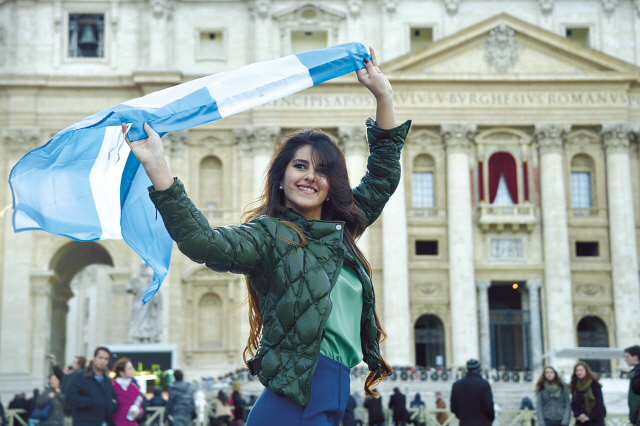Envoys express pride in first Latin American pope
By Korea HeraldPublished : March 17, 2013 - 21:04
“God is an Argentine, and so is the Pope,” read the headlines of one Buenos Aires newspaper.
With the elevation of Cardinal Jorge Mario Bergoglio as the Roman Catholic Church’s first pontiff from Latin America, the pride etched on the faces and sown in the words of not only Argentines everywhere, but of Latin Americans everywhere was palpable.
Among South American envoys in Korea, that positive reaction to news of the new pope slipped out from under the usual diplomatic verbiage.
“I feel proud and humbled at the same time about the selection of an Argentine priest as Pope Francis I. Although it sounds a bit like a contradiction, it is really not,” said Augusto Cesar Granada, the Argentine charge d’affaires to Korea.
With the elevation of Cardinal Jorge Mario Bergoglio as the Roman Catholic Church’s first pontiff from Latin America, the pride etched on the faces and sown in the words of not only Argentines everywhere, but of Latin Americans everywhere was palpable.
Among South American envoys in Korea, that positive reaction to news of the new pope slipped out from under the usual diplomatic verbiage.
“I feel proud and humbled at the same time about the selection of an Argentine priest as Pope Francis I. Although it sounds a bit like a contradiction, it is really not,” said Augusto Cesar Granada, the Argentine charge d’affaires to Korea.

“He is the ‘Pope of the Americas.’ He is from our region. He is from Latin America,” said Paraguayan Ambassador to Korea Ceferino Valdez. “He also helped many Paraguayans living in Buenos Aires while he was cardinal. Also he is of the Jesuit congregation and there is a long historical relationship of the Jesuits with Paraguay.”
“As the first pope from the Americas, his selection also speaks to the strength and vitality of a region that is increasingly shaping our world,” said United States President Barack Obama about the new pope.
In answer to an emailed question, the Vatican’s diplomatic representative here indicated that he was not just Latin America’s pope, but everyone’s:
“A new Pope is not just a novelty ― the Pope is a bearer of hope and optimism, not only for those who profess the Catholic Faith, but also for the whole of humanity, because the Pope as Vicar of Christ on earth, has the mission to teach and preach true peace and brotherhood,” said Apostolic Nuncio to Korea Archbishop Osvaldo Padilla.
He is the church’s first Jesuit pope, and chose the name Francis, inspired by Saint Francis of Assisi, a medieval saint of Italy who came from a wealthy textile family but took a vow of poverty and wore rags instead of fine clothing. The Jesuit order also takes a vow of poverty.
“The first words of Pope Francis I have deep symbolism. He calls his election as an invitation for a journey with the people which presides in trust. He describes this journey as one of brotherhood, love and trust,” Padilla said.
“He also started with a prayer ― the Lord’s Prayer, which is the prayer that Jesus himself taught. For this reason, I believe he wants to go to the deep roots of our Christian faith, which is faith in Jesus Christ, as we can see in the Gospels.”
Indeed, Pope Francis appears to have been gifted with the common touch. While archbishop in Argentina, he rode public buses, lived in a regular apartment instead of the cardinal palace in Buenos Aires, and wore simple clothes. He eschewed the pomp and style of a church that traditionally imbues heavy meaning in ornate rituals and ecclesiastical symbols.
“Francis I has always been a hard-working priest, a true Jesuit and a man always involved closely with the needs of others,” Granada said. “He is a frugal and simple man with a simple and clear way.”
His critics, however, describe the down-to-earth style of Pope Francis I as conservative populist.
Horacio Verbitsky, an Argentine journalist, who has written extensively about Bergoglio described Francis I as “a conservative populist reminiscent of Pope John Paul II,” during an interview with a U.S.-based news program on Thursday.
By conservative populism Verbitsky said he meant Francis I is a man of strong conservative positions in questions of Catholic doctrine but with a touch for popular tastes. “He preaches in rail stations, streets, in poor quarters of the city. He doesn’t wait for people to come to the church. He brings the church to them, but he is staunchly conservative on doctrine questions.”
As cardinal in Argentina he launched an unsuccessful campaign against gay marriage legislation, describing adoption by gay couples as a form of discrimination against children.
He butted heads with Argentine President Cristina Kirchner over the issue, too. Kirchner lambasted his ideas on homosexuality as a throwback to the Inquisition. Gay rights legislation passed in 2010.
Verbitsky is author of the book “The Silence: From Paul VI to Bergoglio: The Secret Relations Between the Church and the ESMA.”
The book explores Bergoglio’s actions during the military dictatorship that ruled Argentina from 1976 to 1983. During that time, up to 30,000 people were kidnapped and killed.
“ESMA” refers to the former navy school that was turned into a detention center where people were tortured by the military dictatorship.
From the publication of Verbitsky’s book, a 2005 lawsuit was filed accusing Jorge Bergoglio for being connected to the 1976 kidnappings of two Jesuit priests, Orlando Yorio and Francisco Jalics.
By Philip Iglauer (ephilip2011@heraldcorp.com)
-
Articles by Korea Herald






![[Weekender] How DDP emerged as an icon of Seoul](http://res.heraldm.com/phpwas/restmb_idxmake.php?idx=644&simg=/content/image/2024/04/25/20240425050915_0.jpg&u=)


![[Music in drama] An ode to childhood trauma](http://res.heraldm.com/phpwas/restmb_idxmake.php?idx=644&simg=/content/image/2024/04/25/20240425050929_0.jpg&u=)









![[Herald Interview] Mistakes turn into blessings in street performance, director says](http://res.heraldm.com/phpwas/restmb_idxmake.php?idx=652&simg=/content/image/2024/04/28/20240428050150_0.jpg&u=20240428174656)
